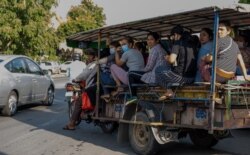The Garment Manufacturer Association in Cambodia requested the Ministry of Labor to delay the minimum wage determination process for 2021, which starts in July, on account of the “fragile and uncertain” nature of the sector amid the COVID-19 pandemic.
On Tuesday, the association, which represents a majority of garment-exporting factories, asked the Labor Ministry to postpone the annual tripartite wage negotiations process, which sets the minimum wage for the garment and footwear sector.
The garment manufacturers group, also known by its acronym GMAC, said the sector was facing a “long recovery” after factories had to suspend their operations because of the economic slowdown initiated by the COVID-19 pandemic. Manufacturers have said that international brands have halted orders, or that some weren’t accepting or paying for existing orders.
“Delaying the minimum wage negotiations will be a mechanism to support the sector to stay alive as well as maintain employment for workers,” read the June 23 statement.
The statement points to the Law on Minimum Wage Article 5 and the Labor Law’s Article 107 which states that the profitability of the sector is one of the seven factors used to determine the wage. It does not talk of the remaining six factors or the economic effects being faced by workers, one of which is the “needs of workers and their families.”
The current minimum wage is $190 a month for 2020, up from the $182 workers were paid per month in 2019. Workers get seniority payments every six months, which has also been suspended this year, as well as overtime payments.
The tripartite discussions started in 2014 and wages have nearly doubled since, from $100 in 2014 to $190 in 2020. The discussions include the government, private sector and worker unions, with pro-worker unions a small minority in this process, and usually culminates in September or October.
Ken Loo, secretary-general of the Garment Manufacturers Association in Cambodia said the current situation warranted the postponement of the minimum wage talks.
“How do this harm workers' benefits? Or do [unions] think that the wage can be increased next year?” he said. “I think that it can't be increased if we look at the formula of seven points.”
Ken Loo did not have figures for factories that have temporarily suspended or shut down their operations, or even the job loss numbers for workers in the sector.
Pav Sina, president of the Collective Union of Movement of Workers (CUMW), said the wage negotiation should go ahead so that the tripartite group can ascertain the COVID-19 consequences for the factories but also the effects faced by workers.
He added that employers needed to be “honest” about their production activity, suggesting that layoffs and work suspensions were not linked to lower levels of orders.
“We have seen that there are jobs to do at factories,” Pav Sina said. “But, the factory owners have taken this opportunity to lay off workers and terminate workers to boost their productivity.”
Yang Sophorn, president of the Cambodia Alliance of Trade Unions, said that the government should heed GMAC’s request only after closely studying and researching the issue to see if there was merit to garment manufacturers’ claims.
“If we don't do anything, we just rely on the employers' request and we are ready to suspend talks at the request of employers, then we can't increase wages and I think it shouldn't be like that,” she said.
Heng Sour, spokesperson for the Ministry of Labor, told VOA Khmer via WhatsApp that the minimum wage talks will go ahead as planned.
“The law requires we have the meeting, so we must have a meeting,” he said. “The law doesn't say wages must be raised every year, meaning it could be raised, it could stay the same, or it could be reduced.”
According to Heng Sour, more than 410 factories had submitted proposals for work suspensions, but that some of them had restarted operations gradually.
The government and factories are expected to provide assistance to workers affected by work suspensions or layoffs, but the process has been mired with inconsistencies.
Ulrika Isaksson, spokesperson for fast-fashion brand H&M, said on Tuesday that the minimum wage talk for 2021 should be conducted and that the brands support the tripartite negotiation process.
“It’s essential, particularly in these unprecedented circumstances, that regular and transparent minimum wage negotiations between workers, employers and governments are held,” she wrote in an email.








